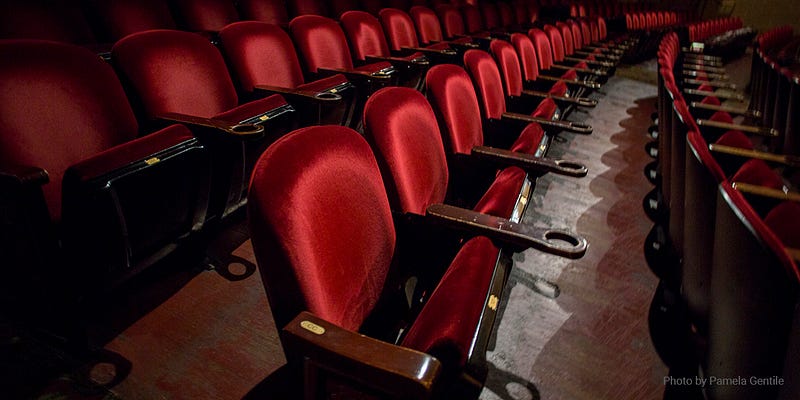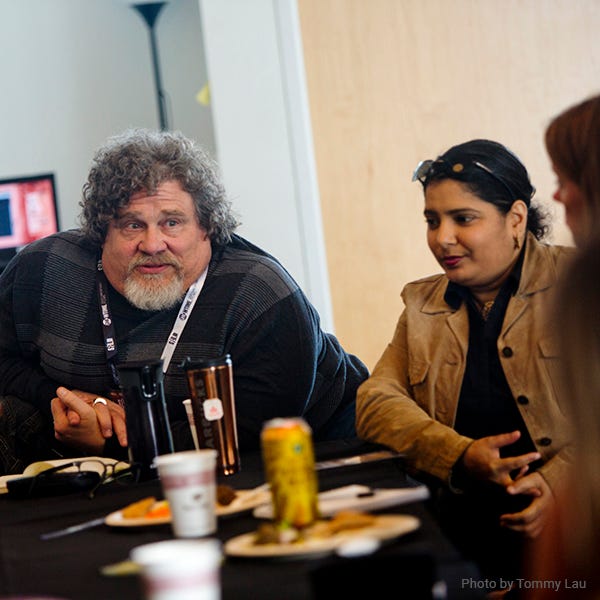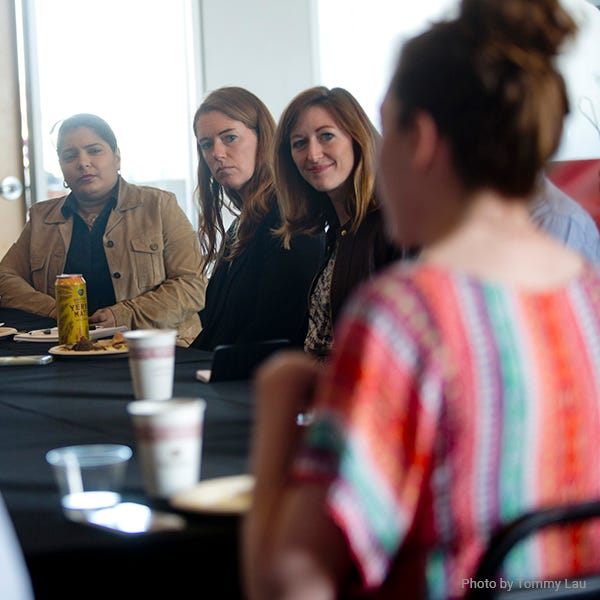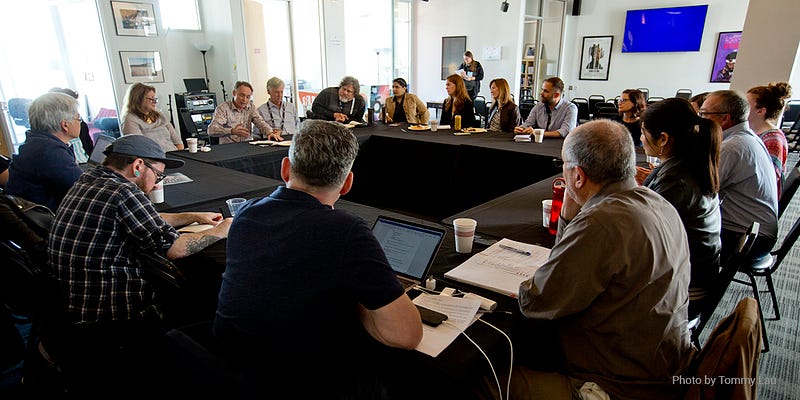The Charge for Accessibility at SFFILM: Takeaways from Year One of the SFFILM Disability Advisory…
The Charge for Accessibility at SFFILM: Takeaways from Year One of the SFFILM Disability Advisory Board

For far too long the film industry has functioned in a status quo of inaccessibility, with SFFILM being very much a part of this troubling norm until recently. Our experience over the last year, taking up the charge of becoming a more accessible film institution, has taught us many important lessons that we are excited to share in hopes that we can inspire action and create a more inclusive film community both locally and nationally.

In 2018, Bay Area filmmaker Jim LeBrecht—co-director with Nicole Newnham of Crip Camp—approached SFFILM about creating a Disability Advisory Board to champion the needs of disabled artists and audiences within the local film community. SFFILM’s values have always included being “dedicated to delivering quality, enrichment, education, access, and enjoyment to everyone in our community,” but we had not dedicated much focused attention to actioning that value when it came to accessibility. We jumped at the chance to form the inaugural Disability Advisory Board composed of exceptional individuals working at the forefront of accessibility, inclusion, and the arts (click here to see current and past members). With their keen insight, here’s how we started (and how you can start too):
- Audit Screening Venues with Disabled Patrons: In the lead-up to our 2019 SFFILM Festival, members of the Advisory Board participated in site visits to various venues in the Bay Area to assess the accessibility of each space, and provide vital feedback on what was needed to make those spaces accessible. While some improvements will take years of planning to achieve, we focused on small but meaningful changes that would make our disabled patrons feel more welcome. At times this was as easy as putting up directional signage in lobbies for ADA restrooms. In other cases this required reducing the number of ticketed seats available in order to create more equitable ADA seating.
- Consider Reception Venues in an Accessibility Plan: SFFILM also looked at the spaces in which we held happy hours and receptions — understanding that in the film world important social and professional connections are made in those rooms, and they should be accessible to all. We made an effort to reinforce this by adding venue accessibility information to all digital invitations in order to allow people to make informed decisions about attending.
- Build Accessibility Into The Website: For disabled patrons, we learned that being able to plan ahead is key. The Disability Advisory Board were active collaborators with our Operations and Communications teams to make SFFILM’s Accessibility web page into a comprehensive FAQ so those enjoying the 2019 Festival with disabilities could know exactly what to expect when they came to an event.
- Design With Accessibility In Mind: Along the way, SFFILM also had a chance to learn from its mistakes. When we presented our printed 2019 Festival guide to the Advisory Board we received critical feedback about how frustratingly inaccessible it was due to color contrast and font choices during the design phase. In 2020, we considered the accessibility of color while creating the Festival branding and integrated feedback from the Advisory Board throughout the process to ensure we did better this time around. The key lesson learned from this experience was not to be afraid of “negative” feedback. This was a vital learning experience and we have established that feedback is only negative if nothing is done with it.
- Building Community and Collective Action Is Key: As we charted our own course for improved accessibility at SFFILM, we also came to the table with broader goals of systemic change that required community and coalition-building. We knew to share knowledge was to share power, and in that spirit SFFILM convened its inaugural Accessibility Congress during the 2019 SFFILM Festival. We gathered Bay Area film and arts leaders to have an open discussion about access and representation. We discussed our priorities and our challenges in activating this work, and had the opportunity to speak candidly with leaders in the Accessibility field about how to holistically weave accessibility into all areas of our work, from venues to programming to communications. For example, conversation about audio description (AD) and closed captioning (CC), led to an important discussion about how SFFILM and other filmmaker support organizations could provide financial and educational resources to prioritize these elements in the filmmaking process.
- Learn From Others: Investigating other organizations’ approach to accessibility and observing events that center the needs of disabled patrons has been incredibly beneficial to SFFILM in this process. We want to especially acknowledge SuperFest Disability Film Festival, which has taught us over the past year.

SFFILM is excited about the progress we made in 2019 and are using the lessons we have learned to continue forward movement into 2020 and beyond. In one of our 2019 Advisory Board meetings, member Lawrence Carter-Long wisely said, “Access means you can get in the room, inclusion means you’re at the table, equity means you set the agenda.”
As we move towards true equity, SFFILM will:
- Look to hire an Accessibility Consultant to further this work
- Launch an Access and Inclusion Fund to help historic Bay Area venues advance capital projects that remedy accessibility issues (seed funding for the Access and Inclusion Fund comes from a Discretionary Award from the Kenneth Rainin Foundation).
- Continue to partner with the Bay Area community to ask pressing and innovative questions around diversity, inclusion, and accessibility
- Engage in valuable collaboration with the Disability Advisory Board in 2020 and beyond.
We still have a lot to learn and a lot to do, but we share our triumphs and challenges on the journey to accessibility in an effort to empower other organizations to learn from us and join us in this charge. No level of action is too small — every inch forward is an inch in the right direction. Know that when you don’t have all the answers (or any of the answers) — it starts with asking the right questions.
If you are a film organization that is interested in starting your own accessibility initiative, please reach out to us. We would be thrilled to have more partners in this work and build a collective that is working to make the film community more accessible nationally.

SFFILM’s Disability Advisory Board consists of these valued members:
Day Al-Mohamed — Author, filmmaker, disability policy expert
Lawrence Carter-Long — Director, Disability & Media Alliance Project for DREDF
Catherine Kudlick — Paul K. Longmore Institute on Disability, San Francisco State University & Superfest
Jim LeBrecht — Filmmaker and sound mixer
Kristen Lopez — Film critic and writer
Dr. Victor Santiago Pineda — President, Windmills & Giants; Adjunct Faculty at University of California, Berkeley
Jen Rainin — CEO, Kenneth Rainin Foundation
Delbert Whetter — Producer, COO/Head of Business Affairs at Exodus Film Group
Alice Wong* — Founder and Director, Disability Visibility Project
For more information about SFFILM’s ongoing accessibility initiatives, visit sffilm.org/accessibility.